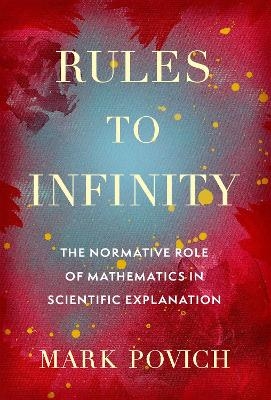
Rules to Infinity
The Normative Role of Mathematics in Scientific Explanation
Seiten
2025
Oxford University Press Inc (Verlag)
978-0-19-767900-5 (ISBN)
Oxford University Press Inc (Verlag)
978-0-19-767900-5 (ISBN)
- Noch nicht erschienen (ca. Februar 2025)
- Versandkostenfrei innerhalb Deutschlands
- Auch auf Rechnung
- Verfügbarkeit in der Filiale vor Ort prüfen
- Artikel merken
This is an open access title available under the terms of a CC BY-NC-ND 4.0 International licence. It is free to read on the Oxford Academic platform and offered as a free PDF download from OUP and selected open access locations.
One of the central aims of science is to provide explanations of natural phenomena. What role does mathematics play in achieving this aim? How does mathematics contribute to the explanatory power of science? Rules to Infinity defends the thesis that mathematics contributes to the explanatory power of science by expressing conceptual rules that allow for the transformation of empirical descriptions. It claims that mathematics should not be thought of as describing, in any substantive sense, an abstract realm of eternal mathematical objects, as traditional Platonists have thought.
This view, which Mark Povich calls "mathematical normativism," is updated with contemporary philosophical tools, which are used to form the argument that normativism is compatible with mainstream semantic theory. This allows the normativist to accept that there are mathematical truths, while resisting the Platonistic idea that there exist abstract mathematical objects that explain such truths. There is a distinction between scientific explanations that are in some sense distinctively mathematical--those that explain natural phenomena in some uniquely mathematical way--and those that are only standardly mathematical, and Povich defends a particular account of this distinction.
Rules to Infinity compares normativism to other prominent views in the philosophy of mathematics, such as neo-Fregeanism, fictionalism, conventionalism, and structuralism, and offers an entry point into debates at the forefront of philosophy of science and mathematics as it defends its novel positions.
One of the central aims of science is to provide explanations of natural phenomena. What role does mathematics play in achieving this aim? How does mathematics contribute to the explanatory power of science? Rules to Infinity defends the thesis that mathematics contributes to the explanatory power of science by expressing conceptual rules that allow for the transformation of empirical descriptions. It claims that mathematics should not be thought of as describing, in any substantive sense, an abstract realm of eternal mathematical objects, as traditional Platonists have thought.
This view, which Mark Povich calls "mathematical normativism," is updated with contemporary philosophical tools, which are used to form the argument that normativism is compatible with mainstream semantic theory. This allows the normativist to accept that there are mathematical truths, while resisting the Platonistic idea that there exist abstract mathematical objects that explain such truths. There is a distinction between scientific explanations that are in some sense distinctively mathematical--those that explain natural phenomena in some uniquely mathematical way--and those that are only standardly mathematical, and Povich defends a particular account of this distinction.
Rules to Infinity compares normativism to other prominent views in the philosophy of mathematics, such as neo-Fregeanism, fictionalism, conventionalism, and structuralism, and offers an entry point into debates at the forefront of philosophy of science and mathematics as it defends its novel positions.
Mark Povich is Visiting Assistant Professor in Philosophy at University of Rochester. He has published articles in The British Journal for the Philosophy of Science, Erkenntnis, Mind, Philosophy of Science, Studies in History and Philosophy of Science Part A, Synthese, among others.
| Erscheinungsdatum | 07.11.2023 |
|---|---|
| Verlagsort | New York |
| Sprache | englisch |
| Maße | 156 x 235 mm |
| Themenwelt | Geisteswissenschaften ► Philosophie ► Erkenntnistheorie / Wissenschaftstheorie |
| Geisteswissenschaften ► Philosophie ► Logik | |
| Geisteswissenschaften ► Philosophie ► Sprachphilosophie | |
| Mathematik / Informatik ► Mathematik | |
| Naturwissenschaften | |
| ISBN-10 | 0-19-767900-5 / 0197679005 |
| ISBN-13 | 978-0-19-767900-5 / 9780197679005 |
| Zustand | Neuware |
| Haben Sie eine Frage zum Produkt? |
Mehr entdecken
aus dem Bereich
aus dem Bereich
die Grundlegung der modernen Philosophie
Buch | Softcover (2023)
C.H.Beck (Verlag)
18,00 €
Buch | Softcover (2023)
Reclam, Philipp (Verlag)
7,00 €


![Was heißt Denken?. Vorlesung Wintersemester 1951/52. [Was bedeutet das alles?] - Martin Heidegger](/media/113619842)